|
|
|
Sort Order |
|
|
|
Items / Page
|
|
|
|
|
|
|
| Srl | Item |
| 1 |
ID:
176091
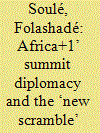

|
|
|
|
|
| Summary/Abstract |
‘RUSSIA–AFRICA SUMMIT 2019’, ‘UK–AFRICA SUMMIT 2020’, ‘Middle East–Africa summit 2020’, ‘Africa–France summit 2020’, ‘Turkey–Africa summit 2020’, ‘Forum on China–Africa Cooperation (FOCAC) 2021’, ‘Russia–Africa summit and Economic forum 2022’. Not a month passes without the announcement of an upcoming ‘Africa+1’ summit, meeting, forum, or other form of summitry1 bringing together the continent’s presidents, ministers, and high-level officials with their traditional, emerging, and aspiring partners or with multilateral organizations.2 Regional bodies like the European Union (EU) have increased the priority given to their Africa strategy as manifested by the European Commission President Ursula von der Leyen’s visit to the African Union (AU) headquarters in February 2020 accompanied by an unprecedented large delegation from Brussels, including 20 commissioners. Non-traditional partners like Malta3 and Estonia4 have also established Africa strategies in 2020. Whether these meetings are focused on promoting trade and investment relations, discussing security matters, or creating platforms to promote a new relationship, they demonstrate that the continent is the subject of rising interest.
|
|
|
|
|
|
|
|
|
|
|
|
|
|
|
|
| 2 |
ID:
192113
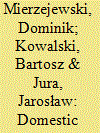

|
|
|
|
|
| Summary/Abstract |
The paper aims to discuss China’s behavior in the developing world through the lens of the domestic model of governance. It does so by seeking analogies between three forms of Beijing’s political approaches in domestic affairs: generating enthusiasm through slogan politics and promised incentives, informal networks, and coordinated development in China-led multilateralism with Africa and Central and Eastern Europe. By discussing the domestic-foreign policy nexus, the paper introduces the concept of China’s vertical multilateralism. Finally, by broaching a new theoretical understanding, the paper decodes China’s behavior in the regions mentioned above and provides an alternative model for understanding China’s foreign policy in the developing world.
|
|
|
|
|
|
|
|
|
|
|
|
|
|
|
|
| 3 |
ID:
139316
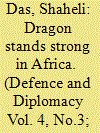

|
|
|
| 4 |
ID:
128824
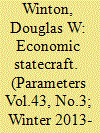

|
|
|
|
|
| Publication |
2013-14.
|
| Summary/Abstract |
China`s investment in Africa is a deliberate policy choice to secure Beijing's economic and political objectives. Chinese policies may undermine or discourage US efforts to create better governance and improved standard of living In Africa, but these effects are incidental and do not threaten vital American interests. The United States should encourage Beijing's participation in international economic institution, and thereby facilitate US economic strength and promote African development.
|
|
|
|
|
|
|
|
|
|
|
|
|
|
|
|
| 5 |
ID:
101111
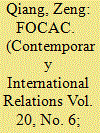

|
|
|
| 6 |
ID:
139005
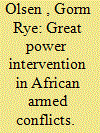

|
|
|
|
|
| Summary/Abstract |
This paper asks why the United States (US), China and the European Union (EU) have intervened in a number of armed conflicts in Africa in the twenty-first century. Scrutiny and comparison of the motivations and interests of the three non-African actors in intervening in African crises are assumed to contribute to understanding the changing geopolitical environment and the current conditions for conflict management in Africa. The focus is not on trade and aid. The paper launches the hypothesis that the explanations why the US, China and the EU have intervened are basically identical. In spite of different evaluations of the specific crisis situations, the interventions have been about taking care of the ‘national interest’ of each of the three non-African actors. National interest is defined as either ‘hard core’ (security) or ‘core’ concerns (security and economic wealth).
|
|
|
|
|
|
|
|
|
|
|
|
|
|
|
|
| 7 |
ID:
183241
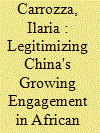

|
|
|
|
|
| Summary/Abstract |
Peace and security were once marginal in Sino-African relations. Recently, however, reflecting China's more proactive role as a global security actor, they have become central. Yet while China's actions mirror this shift, the official China–Africa discourse has not changed. This article, based on fieldwork interviews and discourse analysis of official Forum on China–Africa Cooperation (FOCAC) documents, proposes a theoretically grounded study of China's Africa discourse to account for the role it plays in maintaining continuity through time. It makes a threefold claim. First, while the China–Africa discourse has not been given much attention in the literature, it is crucial to explaining the overall success of China's engagement in the continent. Second, the shift in China's policies towards greater participation in peace and security is not mirrored by changes in the official discourse. Third, and related, this is owing mostly to the successful articulation of the link between the promotion of economic growth and the achievement of stability – the security–development nexus – and to the generally positive reception the discourse has found among African leaders.
|
|
|
|
|
|
|
|
|
|
|
|
|
|
|
|
| 8 |
ID:
117794
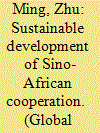

|
|
|
|
|
|
|
|